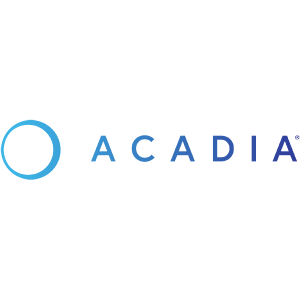Acadia Pharmaceuticals Announces Top-Line Results from Phase 3 ADVANCE-2 Trial of Pimavanserin in Negative Symptoms of Schizophrenia
- Study Did Not Meet Primary Endpoint
“We are disappointed the trial did not meet its primary endpoint given the significant unmet need in patients with negative symptoms of schizophrenia,” said Steve Davis, Acadia’s Chief Executive Officer. “We will continue to analyze these data with our scientific advisors, but we do not intend to conduct any further clinical trials with pimavanserin. We want to thank the patients, their families, and the investigators for their contributions in this important study.”
ADVANCE-2 was a 26-week double-blind, randomized, placebo-controlled study of 34 milligram pimavanserin in 454 adult patients with predominant negative symptoms of schizophrenia who had achieved control of positive symptoms with their ongoing antipsychotic treatment. ADVANCE-2 used the NSA-16 scale, designed to measure change on the wide range of predominant negative symptoms that patients experience, which looks at 16 different items in five subscales and covers symptoms such as blunted affect, poor socialization and lack of motivation. The change from baseline observed in the pimavanserin arm of ADVANCE-2 was similar to the change from baseline observed at the 34 milligram dose in ADVANCE-1 (-11.8 vs. -11.6); however, the placebo effect in ADVANCE-2 was higher than the placebo effect observed in ADVANCE-1 (-11.1 vs. -8.5).
In ADVANCE-2, pimavanserin was well-tolerated with an adverse event rate of
About Acadia Pharmaceuticals
Acadia is advancing breakthroughs in neuroscience to elevate life. For 30 years we have been working at the forefront of healthcare to bring vital solutions to people who need them most. We developed and commercialized the first and only FDA-approved drug to treat hallucinations and delusions associated with Parkinson’s disease psychosis and the first and only FDA-approved drug for the treatment of Rett syndrome. Our clinical-stage development efforts are focused on treating, Prader-Willi syndrome, Alzheimer’s disease psychosis and multiple other programs targeting neuropsychiatric symptoms in central nervous system disorders. For more information, visit us at Acadia.com and follow us on LinkedIn and Twitter.
Forward-Looking Statements
This press release contains forward-looking statements within the meaning of the Private Securities Litigation Reform Act of 1995. Forward-looking statements include all statements other than statements of historical fact and can be identified by terms such as “intends,” “may,” “will,” “should,” “could,” “would,” “expects,” “plans,” “anticipates,” “believes,” “estimates,” “projects,” “predicts,” “potential” and similar expressions (including the negative thereof) intended to identify forward-looking statements. Forward-looking statements contained in this press release, include, but are not limited to, statements about: (i) our clinical development plans related to pimavanserin and (ii) the safety profile of pimavanserin. Forward-looking statements are subject to known and unknown risks, uncertainties, assumptions and other factors that may cause our actual results, performance or achievements to differ materially and adversely from those anticipated or implied by our forward-looking statements. Such risks, uncertainties, assumptions and other factors include, but are not limited to: our dependency on the continued successful commercialization of NUPLAZID and DAYBUE and our ability to maintain or increase sales of NUPLAZID or DAYBUE; our ability to generate or obtain the necessary capital to fund our clinical development plans; the timing and results of our clinical trials; our ability to maintain, protect and enhance our intellectual property; and our ability to continue to stay in compliance with applicable laws and regulations. Given the risks and uncertainties, you should not place undue reliance on these forward-looking statements. For a discussion of these and other risks, uncertainties, assumptions and other factors that may cause our actual results, performance or achievements to differ, please refer to our annual report on Form 10-K for the year ended December 31, 2023 filed with the Securities and Exchange Commission on February 28, 2024, as well as our subsequent filings with the Securities and Exchange Commission from time to time. The forward-looking statements contained herein are made as of the date hereof, and we undertake no obligation to update them after this date, except as required by law.
View source version on businesswire.com: https://www.businesswire.com/news/home/20240311430953/en/
Media Contact:
Acadia Pharmaceuticals Inc.
Deb Kazenelson
(818) 395-3043
media@acadia-pharm.com
Investor Contact:
Acadia Pharmaceuticals Inc.
Al Kildani
(858) 261-2872
ir@acadia-pharm.com
Acadia Pharmaceuticals Inc.
Jessica Tieszen
(858) 261-2950
ir@acadia-pharm.com
Source: Acadia Pharmaceuticals Inc.








